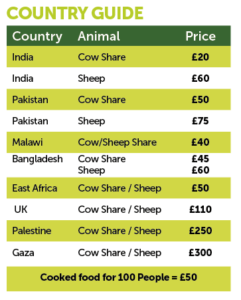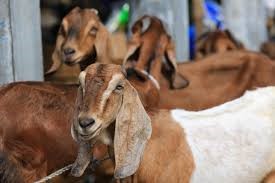On Saturday, 19 January 2019, 10:43:43 GMT, imraan <admin@daruliftaa.net> wrote:
Question:
Salams Mawlana,
I would like to ask, as we live in England and Christmas is creeping up slowly, many Muslims decide to have a feast on Christmas day with the family. They specifically cook Turkey, imitating the non-Muslims.
They say it is the only day the family can get together (as Xmas day is a bank holiday). But I usually tell them Boxing Day is also a Bank HOliday, cook it on the 26th December?
Is cooking a Turkey on Xmas day permissible, in light of the Hadith, “Whoever imitates a nation is from them.”
Ismail, Blackburn
Answer:
In the Name of Allah, the Most Gracious, the Most Merciful.
As-salāmu ‘alaykum wa-rahmatullāhi wa-barakātuh.
Cooking turkey and eating it on Christmas Day is a custom of the Christians.[1]
King Henry VIII was the first English king to eat turkey on Christmas Day. The tradition of eating turkey at Christmas spread throughout England in the 17th century. It also became common to serve goose which remained the predominant roast until the Victorian era. [2]
In the 1900s, turkey became a popular Christmas dish where it became more accessible and affordable.[3]
The Fuqaha (jurists) have ruled that it is impermissible to offer gifts or perform another action that is conducted by the non-Muslims on their sacred days.[4] Consider the following warnings issued by the Fuqaha on such conduct:
Imam Qadhi Khan (rahimahullah) mentions:
وعن الإمام أبي جعفر الكبير رحمه الله تعالى: اذا عبد الرجل خمسين سنة، ثم جاء يوم النيروز وأهدى الى بعض المشركين بيضة يريد به تعظيم يوم النيروز فقد كفر بالله وحبط عمله[5]
“It is narrated from Imam Abu Ja’far Al Kabir (rahimahullah Ta’āla) that if a man worshipped Allah for fifty years, then on the day of Nayruz, he gifted an egg in respect of Nayruz, then he has disbelieved in Allah and all his (good) deeds have been lost.”
Nayruz (also known as Nowruz) is the Zoroastrian New Year’s day. It is celebrated by the Zoroastrians (followers of Zoroastrianism).[6]
It appears that there is nothing wrong in gifting an egg. However, such an act will be analysed in the context of the sacred day of the Zoroastrians. They exchange gifts on that day in reverence of that day. When a Muslim offers another a gift, it resembles the action of the Zoroastrians respecting that day, hence, it is impermissible.
Imam Burhan ad Deen al Bukhari (rahimahullah) has mentioned:
المسلم اذا أهدى يوم النيروز الى مسلم آخر شيئا ولم يرد به تعظيم اليوم ولكن جرى على ما اعتاده بعض الناس لا يكفر، ولكن ينبغي ان لا يفعل ذلك في ذلك اليوم خاصة، ويفعله قبله أو بعده كيلا يكون شبيها بأولئك القوم وقد قال النبي عليه الصلاة والسلام: (من تشبه بقوم فهو منهم)[7]
“If a Muslim gives a gift to another Muslim and he does not intend glorifying that day but it is the habit of some people, he will not have committed kufr. However, he should not do that on that specific day. He should do it before it or after it so as to not imitate those people for verily Nabi (sallallahu alayhi wasallam) has said, “Whosoever imitates a group of people is amongst them.”
Shaikh Zadah Efindi (rahimahullah) mentions:
ويكفر بوضع قلنسوة المجوس على رأسه على الصحيح إلا لتخليص الأسير أو لضرورة دفع الحر والبرد عند البعض وقيل إن قصد به التشبيه يكفر[8]
“According the most correct opinion, that person has committed kufr if he wears the headwear of a Magian except, according to some, to free a prisoner of war or for a need (such as) to keep away the cold and heat. It has been said that if he intended imitation by it, then he has committed kufr.”
Rasulullah (sallallahu alayhi wasallam) is reported to have said:
مَن تَشَبَّه بقومٍ فَهُوَ مِنْهُم[9]
“Whosoever imitates a group of people is amongst them.” (Abu Dawood: 4031)
Therefore, Muslims should not cook turkey on Christmas day and eat it.
And Allah Ta’āla Knows Best
Mizanur Rahman
Student, Darul Iftaa
UK
Checked and Approved by,
Mufti Ebrahim Desai.
[1] British Turkey. 2018. Christmas Day Meal Stats. [ONLINE] Available at: http://www.britishturkey.co.uk/facts-and-figures/christmas-day-meal-stats.html.
The Fact Site. Why Do We Eat Turkey on Christmas Day?. [ONLINE] Available at: https://www.thefactsite.com/2012/12/why-do-we-eat-turkey-on-christmas-day.html.
[2] Wikipedia. 2018. Christmas dinner. [ONLINE] Available at: https://en.wikipedia.org/wiki/Christmas_dinner.
[3] British Turkey. 2018. Christmas Day Meal Stats. [ONLINE] Available at: http://www.britishturkey.co.uk/facts-and-figures/christmas-day-meal-stats.html.
[4] البحر الرائق شرح كنز الدقائق ومنحة الخالق وتكملة الطوري، زين الدين بن إبراهيم المعروف بابن نجيم المصري (المتوفى: 970هـ)، دار الكتاب الإسلامي، القاهرة، مصر (5/ 133)
وبخروجه إلى نيروز المجوس والموافقة معهم فيما يفعلون في ذلك اليوم وبشرائه يوم النيروز شيئا لم يكن يشتريه قبل ذلك تعظيما للنيروز لا للأكل والشرب وبإهدائه ذلك اليوم للمشركين ولو بيضة تعظيما لذلك اليوم
حاشية رد المحتار على الدر المختار: شرح تنوير الأبصار، محمد أمين الشهير بابن عابدين (المتوفى: 1252هـ)، ايچ أيم سعيد كمبني، كراتشي، باكستان (6/ 755-754)
(والإعطاء باسم النيروز والمهرجان لا يجوز) أي الهدايا باسم هذين اليومين حرام (وإن قصد تعظيمه) كما يعظمه المشركون (يكفر) قال أبو حفص الكبير: لو أن رجلا عبد الله خمسين سنة ثم أهدى لمشرك يوم النيروز بيضة يريد تعظيم اليوم فقد كفر وحبط عمله اهـ ولو أهدى لمسلم ولم يرد تعظيم اليوم بل جرى على عادة الناس لا يكفر وينبغي أن يفعله قبله أو بعده نفيا للشبهة ولو شرى فيه ما لم يشتره قبل إن أراد تعظيمه كفر وإن أراد الأكل كالشرب والتنعيم لا يكفر زيلعي.
[5] فتاوى قاضيخان، فخر الدين ابو المحاسن حسن بن منصور المعروف بقاضيخان الأوزجندي (المتوفى: 592هـ)، دار الكتب العلمية (3/519)
وعن الإمام أبي جعفر الكبير رحمه الله تعالى: اذا عبد الرجل خمسين سنة، ثم جاء يوم النيروز وأهدى الى بعض المشركين بيضة يريد به تعظيم يوم اليروز فقد كفر بالله وحبط عمله
[6] Heritage Institute. Nowruz. [ONLINE] Available at: https://www.heritageinstitute.com/zoroastrianism/nowruz/index.htm.
Encyclopædia Britannica. 2013. Nōrūz. [ONLINE] Available at: https://www.britannica.com/topic/Noruz.
[7] المحيط البرهاني، برهان الدين محمود بت صدر الشريعة ابن مازة البخاري (المتوفى:616هـ )، ادارة القرآن والعلوم اسلامية، كراشي باكستان – المجلس العلمي، جوهانسبرغ، جنوبي أفريقية
9287- قال في الجامع الأصغر: رجل اشترى يوم النيروز شيئا لم يكن يشتريه قبل ذلك، ان أراد به تعظيم النيروز كما يظمه المشركون يكفر، وان أراد به الأكل والشرب والنعمة لم يكفر. 9288- قال صاحب الجامع الأصغر المسلم اذا أهدى يوم النيروز الى مسلم آخر شيئا ولم يرد به تعظيم اليوم ولكن جرى على ما اعتاده بعض الناس لا يكفر، ولكن ينبغي ان لا يفعل ذلك في ذلك اليوم خاصة، ويفعله قبله أو بعده كيلا يكون شبيها بأولئك القوم وقد قال النبي عليه الصلاة والسلام: (من تشبه بقوم فهو منهم).
[8] مجمع الأنهر في شرح ملتقى الأبحر ومعه الدر المنتقى في شرح الملتقى، الشيخ زاده المعروف بداماد أفندي (متوفى:1077هـ)، دار الكتب العلمية، بيروت، لبنان (2/ 513)
ويكفر بوضع قلنسوة المجوس على رأسه على الصحيح إلا لتخليص الأسير أو لضرورة دفع الحر والبرد عند البعض وقيل إن قصد به التشبيه يكفر
[9] سنن أبي داود ت الأرنؤوط، أبو داود سليمان بن الأشعث الأزدي السِّجِسْتاني (المتوفى: 275هـ)، دار الرسالة العالمية، بيروت، لبنان (6/ 144)
حدثنا عثمان بن أبي شيبة، حدثنا أبو النضر، حدثنا عبد الرحمن ابن ثابت، حدثنا حسان بن عطيه، عن أبي منيب الجرشي عن ابن عمر، قال: قال رسول الله – صلى الله عليه وسلم -:، من تشبه بقوم فهو منهم”
مرقاة المفاتيح شرح مشكاة المصابيح، علي بن (سلطان) محمد أبو الحسن نور الدين الملا الهروي القاري (المتوفى: 1014هـ)، دار الفكر، بيروت، لبنان – الطبعة الأولى: 2002م (7/ 2782)
(وعنه) : أي عن ابن عمر (قال: قال رسول الله – صلى الله عليه وسلم – (من تشبه بقوم) : أي من شبه نفسه بالكفار مثلا في اللباس وغيره، أو بالفساق أو الفجار أو بأهل التصوف
 The original ‘Ālimiyyah degrees have slowly become so watered down over the years that even those who haven’t been through such programmes feel prepared to offer them now. It went from 8 years full-time, to seven years by summarizing the six books of hadith into one year instead of two, then to 6 years by dropping the six books altogether or incorporating them over the six years, then to 5 years by incorporating the Arabic into the curriculum instead of it being part of a preparatory curriculum, then to 5 years part-time, then to 4 years to match the conventional degrees, then to 4 years part-time to accommodate people’s busy schedules, and now to 6 weekends a year for three years.
The original ‘Ālimiyyah degrees have slowly become so watered down over the years that even those who haven’t been through such programmes feel prepared to offer them now. It went from 8 years full-time, to seven years by summarizing the six books of hadith into one year instead of two, then to 6 years by dropping the six books altogether or incorporating them over the six years, then to 5 years by incorporating the Arabic into the curriculum instead of it being part of a preparatory curriculum, then to 5 years part-time, then to 4 years to match the conventional degrees, then to 4 years part-time to accommodate people’s busy schedules, and now to 6 weekends a year for three years.
 I am a Muslim. I am British.
I am a Muslim. I am British.








 I sincerely felt like I had to explain myself constantly that no, just because it’s not so obvious, it is STILL extremely distressing, painful, and debilitating.
I sincerely felt like I had to explain myself constantly that no, just because it’s not so obvious, it is STILL extremely distressing, painful, and debilitating.
